初中英语句型转换大全
初中英语句型转换方法归纳
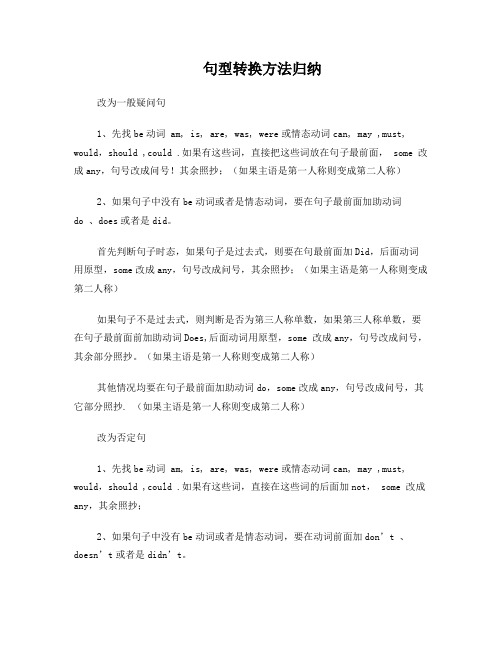
句型转换方法归纳改为一般疑问句1、先找be动词 am, is, are, was, were或情态动词can, may ,must, would,should ,could .如果有这些词,直接把这些词放在句子最前面, some 改成any,句号改成问号!其余照抄;(如果主语是第一人称则变成第二人称)2、如果句子中没有be动词或者是情态动词,要在句子最前面加助动词do 、does或者是did。
首先判断句子时态,如果句子是过去式,则要在句最前面加Did,后面动词用原型,some改成any,句号改成问号,其余照抄;(如果主语是第一人称则变成第二人称)如果句子不是过去式,则判断是否为第三人称单数,如果第三人称单数,要在句子最前面前加助动词Does,后面动词用原型,some 改成any,句号改成问号,其余部分照抄。
(如果主语是第一人称则变成第二人称)其他情况均要在句子最前面加助动词do,some改成any,句号改成问号,其它部分照抄. (如果主语是第一人称则变成第二人称)改为否定句1、先找be动词 am, is, are, was, were或情态动词can, may ,must, would,should ,could .如果有这些词,直接在这些词的后面加not, some 改成any,其余照抄;2、如果句子中没有be动词或者是情态动词,要在动词前面加don’t 、doesn’t或者是didn’t。
首先判断句子时态,如果句子是过去式,则要在动词前面加didn’t,后面动词用原型,some改成any,其余照抄;如果句子不是过去式,则判断是否为第三人称单数,如果第三人称单数,要在动词前面前加doesn’t,后面动词用原型,some 改成any,其余部分照抄。
其他情况均要在句子动词前面加don’t,some改成any,其它部分照抄.对划线部分提问第一步:先把句子改成一般问句第二步:把提问部分省略,在句子最前面加疑问词。
初中英语知识点归纳常用句型及句式转换

初中英语知识点归纳常用句型及句式转换英语学习中,句型和句式是非常重要的基础知识。
掌握常用的句型和灵活运用句式可以帮助我们更好地理解英语语法和提高语言表达能力。
下面是初中英语中常见的句型和句式转换的归纳总结。
一、肯定句和否定句的转换1. 肯定句:主语 + 动词 + 其他成分否定句:主语 + 助动词 do/does/did + not + 动词 + 其他成分例句:He is a doctor.(肯定句)He is not a doctor.(否定句)2. 肯定句:主语 + am/is/are + 名词/形容词 + 其他成分/地点/时间否定句:主语 + am/is/are + not + 名词/形容词 + 其他成分/地点/时间例句:They are students.(肯定句)They are not students.(否定句)3. 肯定句:主语 + 动词 + 副词/介词短语 + 其他成分否定句:主语 + 助动词 do/does/did + not + 动词 + 副词/介词短语 + 其他成分例句:She speaks English fluently.(肯定句)She does not speak English fluently.(否定句)二、一般疑问句和特殊疑问句的转换1. 一般疑问句:肯定句:Do/Does/Did + 主语 + 动词 + 其他成分?否定句:Do/Does/Did + 主语 + 动词 + not + 其他成分?特殊疑问句:疑问词 + 一般疑问句的语序例句:She goes to school by bus.(一般疑问句)Does she go to school by bus?(特殊疑问句)2. 一般疑问句:肯定句:Am/Is/Are + 主语 + 名词/形容词 + 其他成分/地点/时间?否定句:Am/Is/Are + 主语 + not + 名词/形容词 + 其他成分/地点/时间?特殊疑问句:疑问词 + 一般疑问句的语序例句:They are students.(一般疑问句)Are they students?(特殊疑问句)3. 一般疑问句:肯定句:助动词 + 主语 + 动词 + 副词/介词短语 + 其他成分?否定句:助动词 + Do/Does/Did + 主语 + 动词 + not + 副词/介词短语 + 其他成分?特殊疑问句:疑问词 + 一般疑问句的语序例句:He speaks English fluently.(一般疑问句)Does he speak English fluently?(特殊疑问句)三、陈述句和祈使句的转换1. 陈述句:主语 + 动词 + 其他成分祈使句:动词 + 其他成分(一般省略主语 you)例句:They play football.(陈述句)Play football.(祈使句)2. 陈述句:主语 + am/is/are + 名词/形容词 + 其他成分/地点/时间祈使句:Be + 名词/形容词 + 其他成分/地点/时间例句:You are a student.(陈述句)Be a student.(祈使句)3. 陈述句:主语 + 动词 + 副词/介词短语 + 其他成分祈使句:动词 + 副词/介词短语 + 其他成分例句:She speaks English fluently.(陈述句)Speak English fluently.(祈使句)通过以上的归纳总结,我们可以更好地理解和运用常用的句型和句式转换。
初中英语句型转换(附答案)

句型转换I. Why don 'you ask your teacher for help when you are in trouble?(改为同义句)_____________ ask your teacher for help whe n you are in trouble?2.1 used to get up early in the morning.(改为一般疑问句)_____ you ________to get up early in the morning?3.lf you work hard, you 'll catch up with your classmates.(改为祈使句)_________________, and you 'catch up with your classmates.4.1 think we should stay at home to do our homework tonight. (改为否定句)I ________________we should stay at home to do our homework toni ght.5. The Japanese girl can hardly sing a Chinese song.(改为反意疑问句)The Japa nese girl can hardly sing a Chin ese song, _______________ ?6. The teacher allowed the students to go to see the movie.(改为被动语态)The students ________________ to go to see the movie.7. My boss has bee n to Hong Ko ng twice a mon th.(对划线部分提问)has your boss bee n to Hong Kong?8. We study English very hard.(改为感叹句)we study En glish!9. Does Jenny like dancing? Can you tell me?(合并成含有宾语从句的复合句)Can you tell me _______ Jenny ________ dancing?10. The girl with some flowers in her hand is my sister. (改写成含有定语从句的复合句)The girl _________________ some flowers in her hand is my sister.II. There are some books on the desk.(改为否定句)There __________________ books on the desk.12. H e doesn ' t know what he should do改为简单句)He doesn'tknow _________________ d o.13.1 spe nd an hour in readi ng En glish every day.(改为同义句)It _________ me an hour ________ read En glish every day.14. Let' play together.(改为反意疑问句)Let 'splay together, ____________________ ?15. “ Where are you going to spend your holiday? he asked he”.(改为复合句)He asked her _________ she _________ going to spe nd her holiday.16. Tony studies maths very hard in our class.(改为感叹句)___________________ Tony studies maths in our class!17. He is good at physics, and he can work out the difficult exercise. (改为同义句)He ____________________ in physics, and he can work out the difficult exercise.18. There is little milk in the bottle.(改为反意疑问句)There is little milk in the bottle, ____________________ ?19. We can hear the girls singing in the n ext room.(改为被动语态)The girls can _____________________ s inging in the n ext room.20. Lucy will fin ish writi ng an e-mail in half an hour (对戈U线部分提问)___________________ will Lucy finish writ ing an e-mail?21. There are some oranges in the basket.(改为一般疑问句)_______ there __________ oran ges in the basket?22. The boy is too young to go to school.(同义句)The boy is _________ y oung_________he can 'go to school.23. Let' go to the zoo.(反意疑问句)Let 'go to the zoo, ___________________ ?24.1 don 'know what I should do.(改为简单句)I don,tknow what ___________________ .25.1 think Mr. Zhang is ill in hospital.(否定句)I ________ think Mr. Zhang __________ill in hospital.26. He has never been to Beijing.(反意疑问句)He has n ever bee n to Beiji ng, _________________ .27. They are very excited.(感叹句)__________________ t hey are!28. We planted a lot of trees in the village last year.(改为被动语态)A lot of trees____________________ in the village last year.29.1 've been learning English since 2003.(对划线部分提问)___________________ have you bee n lear ning En glish?30.1 don 'like coffee. He does n 'like coffee, either.(合并为一句)_________ I _________ he likes coffee.31.She is a woma n teacher.(改为复数形式)They are ___________________ .32. The twin needs some bananas.(改为否定句)The twin ___________ n eed _________banan as.33. You must n 'throw anything at the an imals whe n you are in the zoo. (改为祈使句)___________________ anything at the ani mals whe n you are in the zoo.34. The Changjiang River is the Iongest river of China.(用Yellow River 改为选择疑问句)_________ is the Ion gest river of Chi na, the Chan gjia ng River ______ the Yellow River?35.1 don 'thinkyou can finish it on time.(改为反意疑问句)I don 'tthink he can finish it on time, ________________________ ?36. The river is 10 meters wide.(对划线部分提问)_____________________ is the river.37. Not only Tom but also Bob has been to that island.(改为同义句)_________ Tom and Bob ________ bee n to that isla nd.38.1 sent a letter to you last mon th.(改为被动语态)A letter ___________________ to you last mon th.39. Your livi ng-room is very bright.(改为感叹句)___________________ your livi ng-room is!40. Does the earth go around the sun? My son asked the teacher.(合并为宾语从句)My son asked the teacher ________ the earth __________ around the sun.41. We had a great time yesterday.(改为感叹句)__________________ g reat time we had yesterday!42. The book cost me five yua n.(改为同义句)I ________ five yua n _________ the book.43. The problem is so hard. I can 'work it out.(合并为简单句)The problem is __________ hard for me ___________ work out.答案:I.Why not 2.Did, you 3.Work; hard 4.don' think 5.can she 6.were allowed 7.How ofte n 8.How hard 9.if/wether ;likes 10.who/that, has/holds 11.are n'ta ny 12.what, to13. t akes; to 14.shall we 15.where; was 16.How hard 17.does well 18.is there 19.be heard 20.How soo n 21.Are; any 22.so; that 23.shall we 24.to do 25.don 'is 26.has he 27.How excited 28.were planted 29.How long 30.Neither nor 31.women teachers 32.doesn' any 33.Don' throw 34.Which or 35.can he 36.How wide 37.Both have38. w as se nt 39.How bright 40.if/whether we nt 41.What a 42.spe nt on 43.too to。
初中英语句型转换类型总结
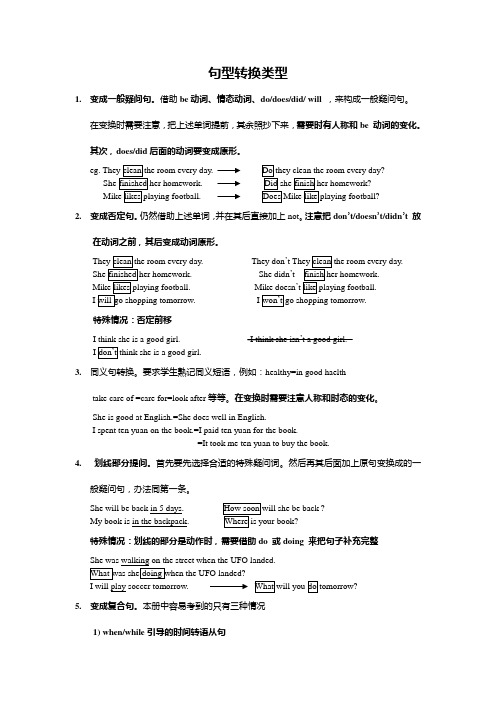
句型转换类型1.变成一般疑问句。
借助be动词、情态动词、do/does/did/ will ,来构成一般疑问句。
在变换时需要注意,把上述单词提前,其余照抄下来,需要时有人称和be 动词的变化。
其次,does/did后面的动词要变成原形。
2.变成否定句。
仍然借助上述单词,并在其后直接加上not。
注意把don’t/doesn’t/didn’t 放在动词之前,其后变成动词原形。
They don’She didn’tMike doesn’特殊情况:否定前移I think she is a good girl. I think she isn’t a good girl.3.同义句转换。
要求学生熟记同义短语,例如:healthy=in good haelthtake care of =care for=look after等等。
在变换时需要注意人称和时态的变化。
She is good at English.=She does well in English.I spent ten yuan on the book.=I paid ten yuan for the book.=It took me ten yuan to buy the book.4.划线部分提问。
首先要先选择合适的特殊疑问词。
然后再其后面加上原句变换成的一般疑问句,办法同第一条。
She will be back in 5 days.My book is in the backpack.特殊情况:划线的部分是动作时,需要借助do 或doing 来把句子补充完整She was walking on the street when the UFO landed.I will play soccer tomorrow.5. 变成复合句。
本册中容易考到的只有三种情况1) when/while引导的时间转语从句She was coolong. Mary came home.2) if 引导的条件状语从句(注意主句、从句使用的时态不同)有or, if 引导的用否定)Work hardIf you work hard, you will pass the exam. (有and, if 引导的用肯定)3)直接引语变成间接引语。
初一英语句型转换

初一英语句型转换陈述句变一般疑问句和否定句陈述句变一般疑问句的方法:1.对于助动词、情态动词、be动词作谓语的,把be动词,can,shall,will等放在句首,(some 改成any,my改成your 等),句点改成问号。
如:He's a teacher. →Is he a teacher?He can swim. →Can he swim?He'd like to go there. →Would he like to go there?2.对于实意动词作谓语的,动词原型借助do,三人称单数借助does,过去式借助did,加在句首,再把谓语改为动词原形,(some 改成any,my改成your等),句点改成问号。
如:I like him. →Do I like him?He likes me. →Does he like me?I liked him. →Did I like him?补充:陈述句变特殊疑问句先改一般疑问句,去掉要提问的成分,再在句首加相应疑问词。
如:will go there by bus. Will I go there by bus?二、肯定句变否定句的方法1、在be动词后加not。
如:is not ,are not ,am not,was not,were not;2、在can,should,will等后加not。
如:cannot,should not,will not;3、上述都没有的,在动词前加助动词否定形式don’t/doesn’t/didn’t。
4、some 改成any。
根据句后括号内的要求改写句子陈述句:陈述一件事实的句子,句末用句号。
一般疑问句:对一件不确定的事进行提问,要对方确定。
回答用yes/no,主语+be/情态动词/助动词(谁问谁答)陈述句变一般疑问句的方法:有be(am/is/are)/情态动词(can /may/must…)/助动词的,直接将它提到主语前。
初中英语句式变换

初中英语句式变换初中英语句式变换主要包括以下几种:1. 被动句与主动句的转换:主动句:The teacher teaches the students.被动句:The students are taught by the teacher.2. 疑问句与否定句的转换:疑问句:Does she like English?否定句:She doesn't like English.3. 肯定句与否定句的转换:肯定句:He is a good student.否定句:He is not a good student.4. 祈使句与陈述句的转换:祈使句:Don't talk loudly in the library.陈述句:Talking loudly in the library is not allowed.5. 一般疑问句与反义疑问句的转换:一般疑问句:Do you like sports?反义疑问句:Do you like sports, don't you?6. 并列句与复合句的转换:并列句:He studies hard and he is very talented.复合句:He studies hard, and he is very talented. 7. 简单句与复杂句的转换:简单句:She reads a book.复杂句:She reads a book every day after school.8. 名词从句与状语从句的转换:名词从句:We don't know what he said.状语从句:We don't know what he said because we weren't there.9. 状语从句与宾语从句的转换:状语从句:She said that she would help me.宾语从句:She said she would help me.10. 情态动词与实义动词的转换:情态动词:Can you pass me the pencil, please?实义动词:You can pass me the pencil, please.这些句式变换是初中英语学习中常见的,掌握它们有助于提高你的英语表达能力。
初中英语句型转换题
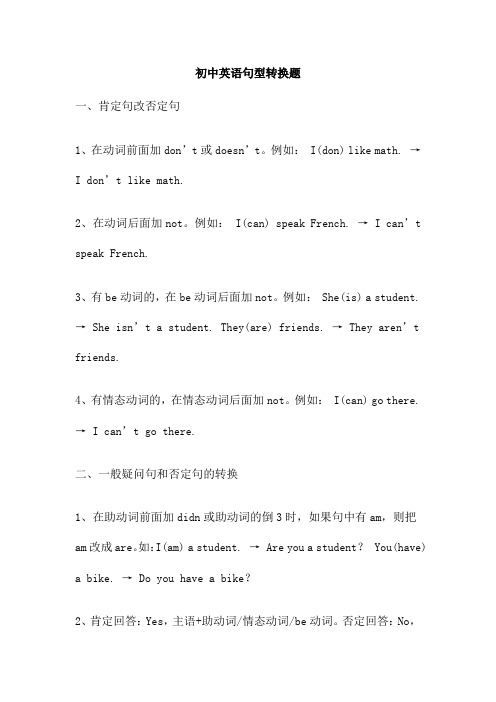
初中英语句型转换题一、肯定句改否定句1、在动词前面加don’t或doesn’t。
例如: I(don) like math. →I don’t like math.2、在动词后面加not。
例如: I(can) speak French. → I can’t speak French.3、有be动词的,在be动词后面加not。
例如: She(is) a student. → She isn’t a student. They(are) friends. → They aren’t friends.4、有情态动词的,在情态动词后面加not。
例如: I(can) go there. → I can’t go there.二、一般疑问句和否定句的转换1、在助动词前面加didn或助动词的倒3时,如果句中有am,则把am改成are。
如:I(am) a student. → Are you a student? You(have)a bike. → Do you have a bike?2、肯定回答:Yes,主语+助动词/情态动词/be动词。
否定回答:No,主语+助动词/情态动词/be动词 not。
如:—Are you a student?—Yes,I am./No,I am not.3、在情态动词或助动词前面加didn或助动词的倒3时,如果句中有was,则把was改成were。
如:He(was) here an hour ago. → Were you here an hour ago?4、就一般疑问句提问。
如:He(is) a doctor. → Is he a doctor?They(have) a car. → Do they have a car? We(will) go to school tomorrow. → Will we go to school tomorrow? They(can) swim. → Can they swim?5、就否定句提问。
初中句型转换专项
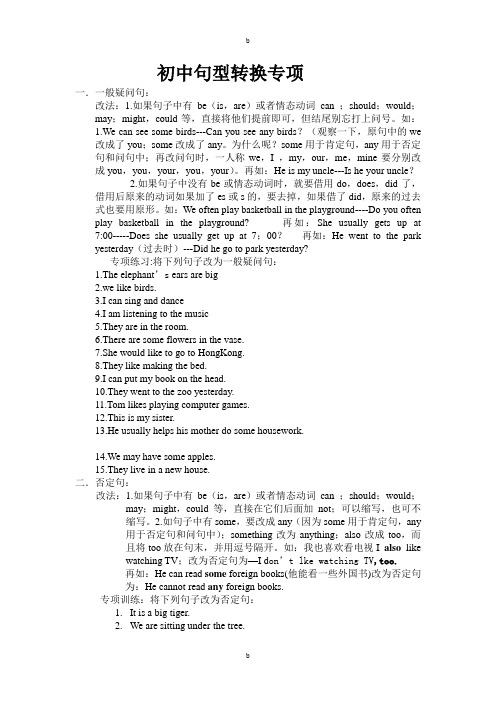
初中句型转换专项一.一般疑问句:改法:1.如果句子中有be(is,are)或者情态动词can ;should;would;may;might,could等,直接将他们提前即可,但结尾别忘打上问号。
如:1.We can see some birds---Can you see any birds?(观察一下,原句中的we改成了you;some改成了any。
为什么呢?some用于肯定句,any用于否定句和问句中;再改问句时,一人称we,I ,my,our,me,mine要分别改成you,you,your,you,your)。
再如:He is my uncle---Is he your uncle?2.如果句子中没有be或情态动词时,就要借用do,does,did了,借用后原来的动词如果加了es或s的,要去掉,如果借了did,原来的过去式也要用原形。
如:We often play basketball in the playground----Do you often play basketball in the playground? 再如:She usually gets up at 7:00-----Does she usually get up at 7;00?再如:He went to the park yesterday(过去时)---Did he go to park yesterday?专项练习:将下列句子改为一般疑问句:1.The elephant’s ears are big2.we like birds.3.I can sing and dance4.I am listening to the music5.They are in the room.6.There are some flowers in the vase.7.She would like to go to HongKong.8.They like making the bed.9.I can put my book on the head.10.They went to the zoo yesterday.11.Tom likes playing computer games.12.This is my sister.13.He usually helps his mother do some housework.14.We may have some apples.15.They live in a new house.二.否定句:改法:1.如果句子中有be(is,are)或者情态动词can ;should;would;may;might,could等,直接在它们后面加not;可以缩写,也可不缩写。
初中阶段一些常见、有用的句型转换
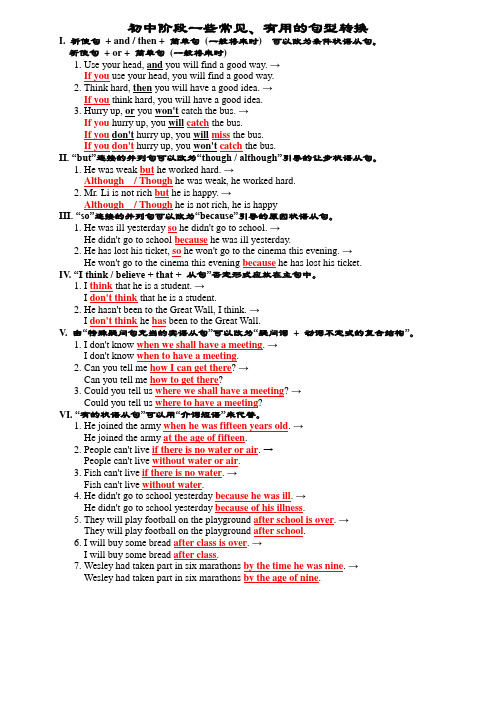
初中阶段一些常见、有用的句型转换I. 祈使句+ and / then + 简单句(一般将来时) 可以改为条件状语从句。
祈使句+ or + 简单句(一般将来时)e your head, and you will find a good way. →If you use your head, you will find a good way.2.Think hard, then you will have a good idea.→If you think hard, you will have a good idea.3.Hurry up, or you won't catch the bus.→If you hurry up, you will catch the bus.If you don't hurry up, you will miss the bus.If you don't hurry up, you won't catch the bus.II. “but”连接的并列句可以改为“though / although”引导的让步状语从句。
1. He was weak but he worked hard.→Although / Though he was weak, he worked hard.2. Mr. Li is not rich but he is happy.→Although / Though he is not rich, he is happyIII. “so”连接的并列句可以改为“because”引导的原因状语从句。
1. He was ill yesterday so he didn't go to school.→He didn't go to school because he was ill yesterday.2. He has lost his ticket, so he won't go to the cinema this evening.→He won't go to the cinema this evening because he has lost his ticket.IV. “I think / believe + that + 从句”否定形式应放在主句中。
七年级英语句型转换题

七年级英语句型转换题英语句型转换是提高语言运用能力和理解能力的重要训练方法之一。
在七年级的英语学习中,句型转换可以帮助学生更好地掌握英语语法规则,提高句子的表达能力,增加对不同语言结构的理解。
下面将详细介绍一些七年级英语句型转换题。
一、陈述句与一般疑问句转换1. 陈述句:He is a student.一般疑问句:Is he a student?2. 陈述句:She plays tennis every Sunday.一般疑问句:Does she play tennis every Sunday?3. 陈述句:They have lunch at 12:00.一般疑问句:Do they have lunch at 12:00?4. 陈述句:We live in London.一般疑问句:Do we live in London?5. 陈述句:You like chocolate ice cream.一般疑问句:Do you like chocolate ice cream?二、一般疑问句与陈述句转换1. 一般疑问句:Can she swim?陈述句:She can swim.2. 一般疑问句:Have they been to Beijing?陈述句:They have been to Beijing.3. 一般疑问句:Is it raining?陈述句:It is raining.4. 一般疑问句:Did he watch TV last night?陈述句:He watched TV last night.5. 一般疑问句:Do you like pizza?陈述句:You like pizza.三、陈述句与否定句转换1. 陈述句:She is a doctor.否定句:She is not a doctor.2. 陈述句:I can swim.否定句:I cannot swim.3. 陈述句:We visit our grandparents every summer.否定句:We do not visit our grandparents every summer.4. 陈述句:He likes playing basketball.否定句:He does not like playing basketball.5. 陈述句:They have finished their homework.否定句:They have not finished their homework.四、特殊疑问句与陈述句转换1. 特殊疑问句:What is your name?陈述句:My name is Tom.2. 特殊疑问句:When did you wake up this morning?陈述句:I woke up this morning.3. 特殊疑问句:Where is the nearest supermarket?陈述句:The nearest supermarket is here.4. 特殊疑问句:How many students are there in your class?陈述句:There are 30 students in my class.5. 特殊疑问句:Why did you go to the park yesterday?陈述句:I went to the park yesterday for a picnic.通过以上的例题,可以看出七年级英语句型转换题主要包括陈述句与一般疑问句的转换、一般疑问句与陈述句的转换、陈述句与否定句的转换以及特殊疑问句与陈述句的转换等。
八年级英语句型转换20题
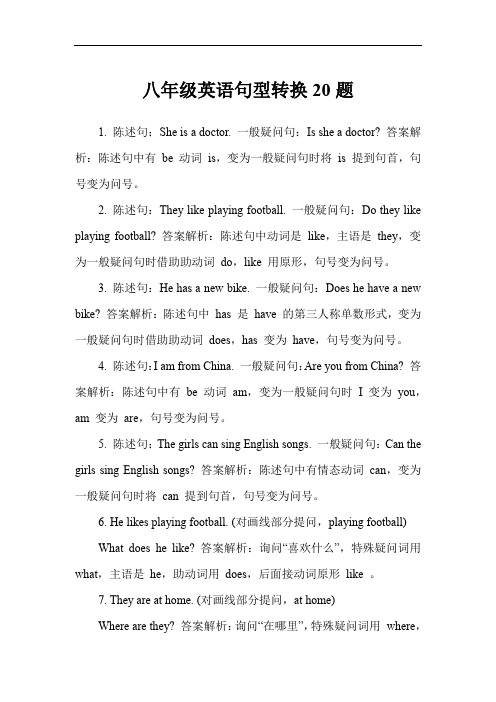
八年级英语句型转换20题1. 陈述句:She is a doctor. 一般疑问句:Is she a doctor? 答案解析:陈述句中有be 动词is,变为一般疑问句时将is 提到句首,句号变为问号。
2. 陈述句:They like playing football. 一般疑问句:Do they like playing football? 答案解析:陈述句中动词是like,主语是they,变为一般疑问句时借助助动词do,like 用原形,句号变为问号。
3. 陈述句:He has a new bike. 一般疑问句:Does he have a new bike? 答案解析:陈述句中has 是have 的第三人称单数形式,变为一般疑问句时借助助动词does,has 变为have,句号变为问号。
4. 陈述句:I am from China. 一般疑问句:Are you from China? 答案解析:陈述句中有be 动词am,变为一般疑问句时I 变为you,am 变为are,句号变为问号。
5. 陈述句:The girls can sing English songs. 一般疑问句:Can the girls sing English songs? 答案解析:陈述句中有情态动词can,变为一般疑问句时将can 提到句首,句号变为问号。
6. He likes playing football. (对画线部分提问,playing football)What does he like? 答案解析:询问“喜欢什么”,特殊疑问词用what,主语是he,助动词用does,后面接动词原形like 。
7. They are at home. (对画线部分提问,at home)Where are they? 答案解析:询问“在哪里”,特殊疑问词用where,主语是they,be 动词用are 。
8. She goes to school by bike. (对画线部分提问,by bike)How does she go to school? 答案解析:询问“出行方式”,特殊疑问词用how,主语是she,助动词用does,后面接动词原形go 。
初中英语句型转换

初中英语句型转换肯定句陈述句否定句句型一般疑问句疑问句特殊疑问句一、陈述句1、概述用来叙述一个事实或观点的句子叫陈述句(declarative sentence)。
陈述句有肯定和否定两种形式,一般用降调,句末用句号。
2、语序陈述句的语序一般是“主语+谓语部分”,或“主语+系动词+表语”。
The ruler is blue.这把尺子是蓝色的。
I’m a student.我是一个学生。
I lost my way.我迷路了。
He likes playing cards.他喜欢玩卡片。
You can give it to me.你可以把它拿给我。
3、否定结构用not和助动词或情态动词否定,not一般放在助动词或情态动词之后。
I’m not a thief.我不是小偷。
I can not swim.我不会游泳。
He doesn’t like sports.他不喜欢运动。
4、肯定句和否定句的转换:(句中有some,要改成any.)第一步:看句中有没有be动词(am、is、 are、 was、 were)、和情态动词(can、could、must、will、would、shall、should、may、might等),如果有,则直接在其后面加not,例如:The ruler is blue.这把尺子是蓝色的。
(改为否定句)The ruler is not blue.这把尺子不是蓝色的。
I can swim.我会游泳。
(改为否定句)I can not swim.我不会游泳。
第二步:如果句中没有be动词情态动词,则根据谓语动词的形式借助do的相应形式放在谓语动词前面。
具体方法是:如果谓语动词是原形或者主语是第一人称、第二人称、第三人称复数则借助do;如果谓语动词是一般现在时第三人称单数形式,则借does;需要注意的是,借does后,原句的谓语动词要变回原形;如果谓语是过去式,则借助did,例如:He likes sports.他喜欢运动。
中考英语丨初中英语句型转换大全
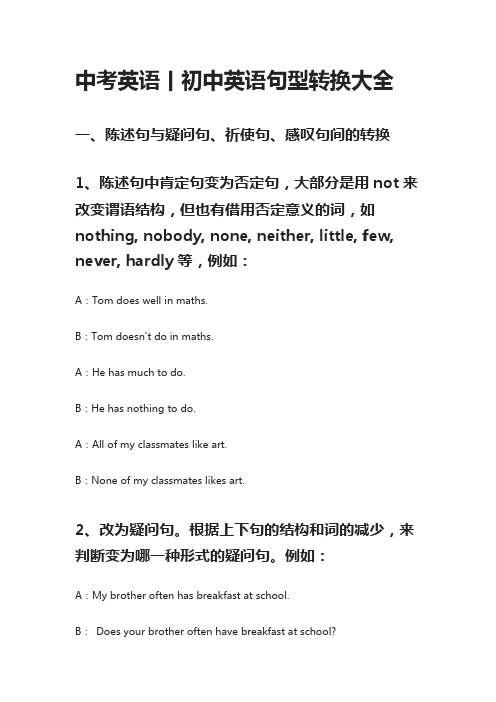
中考英语丨初中英语句型转换大全一、陈述句与疑问句、祈使句、感叹句间的转换1、陈述句中肯定句变为否定句,大部分是用not来改变谓语结构,但也有借用否定意义的词,如nothing, nobody, none, neither, little, few, never, hardly等,例如:A:Tom does well in maths.B:Tom doesn't do in maths.A:He has much to do.B:He has nothing to do.A:All of my classmates like art.B:None of my classmates likes art.2、改为疑问句。
根据上下句的结构和词的减少,来判断变为哪一种形式的疑问句。
例如:A:My brother often has breakfast at school.B:Does your brother often have breakfast at school?A:Tom's already weak in English.B:Tom's already weak in English, isn't he ?A:The red light changes every two minutes.B:How often does the red light change?3、改为感叹句。
根据所给的句子结构和单词的词性,来确定使用哪一种感叹句的形式,例如:A:This is an interesting book.B:What an interesting book this is!或How interesting this book is!二、同义句转换。
根据上句,写出一个意思相同(或相近)的下句,此类形式繁多,内容复杂,涉及面广,归类如下:1、同义词或词组之间的转换。
初一英语语法--句型转换(详细内容)

初一英语语法--句型转换(详细内容)初一英语语法—句型转换内容:陈述句:肯定句否定句疑问句:一般疑问句特殊疑问句一.肯定句变否定句1.句子中有be,在be后加not。
(be动词有am , is , are, was, were)1)I am a student. I am not a student.2)They are blue . They aren’t blue.3) He is Kangkang. He is n’t Kangkang .4) I was ten last year. I wasn't ten yesterday.5) He was good at English. He wasn't good at English.6) They were at home last Sunday. They weren't at home last Sunday.练习:把下列句子变为否定句1.His father is an English teacher._____________________________2.He is crying under the tree. ___________________________ __3.He was thirteen years old two years ago._______________________4.They are very lucky.______________________________________5.t the family was poor.6.My voice was too weak.2.谓语是动词原形,在动词前加don’t。
7.I have a book . I don’t have a book.8.They like Chinese . They don’t like Chinese.9.3) We come from China. We don’t come from China.3.谓语动词是第三人称单数,在动词前加doesn’t,动词用原形。
初中英语句型转换专项练习题及答案

初中英语句型转换专项练习题及答案一、句型转换(主动句变被动句)1. They built a new school in our neighborhood.→ A new school was built in our neighborhood by them.2. My mother will clean the house tomorrow.→ The house will be cleaned by my mother tomorrow.3. They are making a cake in the kitchen.→ A cake is being made in the kitchen by them.4. Someone had already booked a table at the restaurant.→ A table had already been booked at the restaurant.5. The dog chased the cat up the tree.→ The cat was chase d up the tree by the dog.二、句型转换(肯定句变否定句)1. Jane sings very well.→ Jane doesn't sing very well.2. They usually go swimming in the summer.→ They don't usually go swimming in the summer.3. My father can fix the computer.→ My father can't f ix the computer.4. We have finished our homework.→ We haven't finished our homework.5. She enjoys playing the piano.→ She doesn't enjoy playing the piano.三、句型转换(陈述句变疑问句)1. They live in Paris.→ Do they live in Paris?2. You have finished your homework.→ Have you finished your homework?3. Kate was swimming in the pool.→ Was Kate swimming in the pool?4. He can speak three languages.→ Can he speak three languages?5. I will go to the movies tonight.→ Will I go to the movies tonight?四、句型转换(正常语序变倒装语序)1. She is listening to music.→ Is she listening to music?2. They have finished their breakfast.→ Have they finished their breakfast?3. Kate will visit her grandmother tomorrow.→ Will Kate visit her grandmother tomorrow?4. He can speak French.→ Can he speak French?5. The students were playing basketball in the gym.→ Were the students playing basketball in the gym?五、句型转换(选择疑问句变宾语从句)1. Where did you go yesterday?→ Can you tell me where you went yesterday?2. How long have they been friends?→ Do you know how long they have been friends?3. Are you going to the party?→ Could you tell me if you are going to the party?4. Why did she choose that book?→ I wonder why she chose that book.5. Which color do you like best?→ Can you tell me which color you like best?以上是初中英语句型转换专项练习题及答案,希望对您的学习有所帮助。
初三英语句型转换练习40道

初三英语句型转换练习40道1. She plays basketball every day. (改为一般过去时)答案:She played basketball yesterday.解析:一般现在时变为一般过去时,谓语动词要变成过去式。
play 的过去式是played。
2. They are at home now. (改为一般过去时)答案:They were at home yesterday.解析:are 的过去式是were。
3. I do my homework in the evening. (改为一般过去时)答案:I did my homework last night.解析:do 的过去式是did。
4. He doesn't like music. (改为一般过去时)答案:He didn't like music.解析:doesn't 的过去式是didn't,后面接动词原形like。
5. Does she go to school by bike? (改为一般过去时)答案:Did she go to school by bike?解析:does 的过去式是did,后面接动词原形go。
6. They are playing football now. (改为过去进行时)答案:They were playing football at that time.解析:现在进行时改为过去进行时,be 动词由are 变为were,now 变为at that time。
7. She was doing her homework at 8 o'clock last night. (改为现在进行时)答案:She is doing her homework now.解析:过去进行时改为现在进行时,be 动词由was 变为is,at 8 o'clock last night 变为now。
- 1、下载文档前请自行甄别文档内容的完整性,平台不提供额外的编辑、内容补充、找答案等附加服务。
- 2、"仅部分预览"的文档,不可在线预览部分如存在完整性等问题,可反馈申请退款(可完整预览的文档不适用该条件!)。
- 3、如文档侵犯您的权益,请联系客服反馈,我们会尽快为您处理(人工客服工作时间:9:00-18:30)。
句型转换1.My mother is watching TV now. (用sometimes改写)My mother sometimes __________ ________ at home.2.Tom often plays football on Sundays. (划线提问)___________ _________ Tom often _________ on Sundays.3.He sleeps nine hours every night.(划线提问)_________ __________ ________ he sleep every night?4.He didn’t go to school yesterday. I think. (合并为一句)I _________ ________ he ________ _________ school yesterday.5.It’s important that we s hould eat a balanced diet. (同意句)It’s important _________ _________ _________ __________ a balanced diet.6.What’s the trouble with Tony? (同意句)________ ________ ________ with Tony?7.The boy has to play the piano every day.(一般疑问句)________ the boy _______ ________ play the piano every day?8.We hope that we can visit this place again.(同意句)We hope ________ ________ this place again.9.He decided to buy a new house.(同意句)He decided ________ __________ a new house.10.The Smiths are going to New York on May 10th.(划线提问)_________ __________ ___________ ___________ the Smiths going?11.The early bus takes him to school.(同意句)He __________ __________ __________ _________ to school.12.It took him about an hour to do his homework every day.(同意句)He _________ about an hour _________ __________ his homework every day.13.Lily lives about 10 kilometers from the airport.(划线提问)_________ _________ _________ Lily __________ from the airport.14.It was Friday, the 12th yesterday.(划线提问)_________ __________ yesterday?15.Why don’t you come and play soccer with us?(同意句)_______ __________ come and play soccer with us?16.They are busy studying for the test.(划线提问)_________ __________ they busy __________ ?17.I’m 13. he is 15.(合并句一句)I’m ________ _________ _________________ him.18.Both of us are good at schoolwork.(同意句)_______ are ________ good at schoolwork.19.I have two apples,he has two apples ,too.(合并为一句)I have _______ ________ ________ ________ he.20.I think English is more difficult than the other subjects.(同意句)I don’t think the other subjects are ______ __________ ________ English.21.We need to have much water.(线提问)_________ ___________ you________ __________ ________ ?22.My mother put in two teaspoons of butter.(划线提问)___________________ butter _________ your mother _______ in?23.There were some sharks .(一般疑问句并做否定回答)_______ ________ ________ sharks? No, there _________>24.My sister stayed there for two years.(划线提问)_________ ____________________ your sister _________ there?25.He began to learn the accordion when he was five years old.(同意句)________ _______ ________ _______ _______ , he began to learn the accordion.26.She wants to be a computer programmer .(同意句)She ________________ ________ _________ a computer programmer.27.The student have a school trip in spring.(用next week 代替spring)The students ________ ________ ________ _________ a school trip next week.28.He is going to be an engineer when he grows up.(划线提问)_________ is he going to ________ when he grows up?29.I have to stay at home because of the cold weather.(同意句)I have to stay at home _________ ________ _________.30.You took care of my dog when I was not at home . Thank you.(合并为一句)Thanks __________ ______ ________ _______ my dog when I was not at home.31.He is very young. He can’t carry the heavy box.(合并为一句)He is _______ _________ _________ carry the heavy box.32.The car is too expensive for me to buy it.(同意句)The car isn’t________ _____ for me to buy it.33.Jim likes apples better than any other fruit.(同意句)Jim likes apples _______ _________ _________ the fruits.34.He went to Beijing by train.(同意句)He _______ _______ _________ to Beijing.35.Tina bought a gift yesterday.(变为否定句)Tina ________ _________ a gift yesterday.36.Bob won the first prize in the competition three years ago.(划线提问)________ ________ Bob ________ the first prize in the competition?37. The kids are going to the zoo by bike.(划线提问)_______ _________ the kids ________ to the zoo?37.I can buy some drinks and snacks.(改为语气委婉的提问)_______ _________ _________ ___________ __________ ______ _______ ?38.Nobody is more active than Meimei.(同意句)Meimei is __________ __________ __________ of all.39.How much is your T-shirt?(同意句)________ the _________ of your T-shirt?40.Helen has the same idea as Gina.(同意句)Helen _________ __________ Gina.初二英语句型转换练习1.There’s no time to have lunch. (改反意疑问句)There’s no time to have lunch, ______ _______?2.What does he often do on Monday?(用last Monday改写)What _____ he _____ last Monday?3.Her brother likes apples very much.(改否定句)Her brother _______ like apples ______ _______.4.Jim couldn’t find the book on the desk. (改反意疑问句)Jim couldn’t find the book on the desk, ______ ______?5.I don’t think he can move the table. (改反意疑问句)I don’t think he can move the table, ______ ______?6.Both of the boys are good at swimming. (改否定句)_______ of the boys _____ good at swimming.7.It’s wet and hot today. (就划线部分提问)What’s _____ _______ ______ today?8.They lived there for twenty years. (就划线部分提问)______ ______ ______ they live there?9.The teacher is talking with her father. (就划线部分提问)_____ _____ the teacher ________ _______?10.He has to do the washing on Saturday. (就划线部分提问)_____ _____ he______ to _____ on Saturday?11.You teacher seemed angry. (改反意疑问句)Your teacher seemed angry,______ ______?12.We went to Wuhan every two years. (就划线部分提问)_______ ____________ you ______ to Wuhan?13.My aunt went back ten months ago. (就划线部分提问)______ ______ your aunt go back?14.My brother has to drive the car. (改一般疑问句)______ _______ brother______ to drive the car?15.We’ll have to eat mooncakes in the room. (改否定句)We ______ _______ to eat mooncakes in the room.16.He must do it today. (改反意疑问句)He must do it today, ______ _______?17.There is something wrong with the radio. (改否定句)There _____ _________ wrong with the radio.18.Someone is in the room. (改反意疑问句)Someone is in the room, ____________?19.The man said nothing for a moment. (就划线部分提问)______ ______ the man _____ for a moment?20.We can’t find the sign somewhere. (改一般疑问句)______ ______ find the sign __________?21.Both of the stories are interesting. (改否定句)_______ ______ the stories _____ interesting.22.You’d better go out at night. (改否定句)You’d ______ ______ go out at night.23.It’s a terrible cough. (改感叹句)______ ____ _________ cough!24.Either Jim or Kate will go to Hainan for the winter holidays. (否定句)_________ Jim ______ Kate will go to Hainan for the winter holidays.25.Mike watched TV last night.(就画线部分提问)_____ _____ Mike ______ last night?26.You mustn't play on the road.(改为祈使句)______ ______ on the road.27.Must I finish my homework today?(给出否定回答)______, you ______.28.He is a very clever boy.(改为感叹句)______ a ______ boy he ______!= _____ _______ the boy _____!29.Mrs. Green does some shopping every day.(完成反意疑问句)Mrs. Green does some shopping every day ,______ _______?30.His father took him to the park yesterday.(就画线部分提问)______ ______ his father ______ him to the park?31.There is some water in the bottle.(改为否定句)There ______ ______ water in the bottle32.She went to London by air yesterday.(就画线部分提问)______ ______ she ______ to London yesterday?33.You can't leave your son by himself, can you?(给出否定回答)______, I ______.34.The weather is very bad.(改为感叹句)______ ______ weather!35.We ran to the tree. We couldn't see any more monkeys.(把两个简单句连成一个并列句)We ran to the tree, ______ we couldn't see any more monkeys.36.It took me two hours to mend the bike.(就画线部分提问)______ ______ ______ it ______ you to mend the bike?37.I turned on the radio. We sat down and listened to the music.(把两个简单句连成一个并列句)I turned on the radio _____ we sat down and listened to the music.38. Turn off the radio. (改反意疑问句)Turn off the radio, _________ ________?39.The boy is so strong. He can carry the heavy box.(把两个句子合并成一个句子)The boy is _________ ________ to carry the heavy box.40. He told me to bring some food. (变成否定句))He ______ me ______________ bring ______ food.41.He is a boy of five. He can speak a little English. (连成并列句)He is a boy of five, _______ he can speak a little English.42. Both you and I are happy. (变成否定句)_____ you ________ I ________ happy.43.Swimming is my favourite.(同义句转换)My ________sport is________.44.Let's cook something English. (变成反意疑问句)Let's cook something English,________ ________?45.I like chicken than any of others.(同义句转换)I like chicken _____ ______ ______.47.He likes cabbages. (用tomatoes改成选择疑问句)________ he ________ cabbages ________ ________?48.I’ll tell my father about it tomorrow. (用yesterday 改写句子)I ________ my father about it ________.49.This kind of food is delicious. (变成感叹句)________ ________ this kind of food is!50.There is something interesting in today's newspaper.(变一般疑问句)________ ________ _______ interesting in today's newspaper?51.Tom is writing the new words on the blackboard.(就划线部分提问)________ ________ Tom________?52.They are going to leave at nine. (就划线部分提问)________ ________ are they going to leave?53.Mr. Smith usually goes to work by bike.(就划线部分提问)________ ________ Mr. Smith usually ________ to work?54.Tim always has supper at home.(改为一般疑问句)________Tim ________ ________ supper at home? 55..my pencil, your pencil, long (用…than…连成一个句子)。
